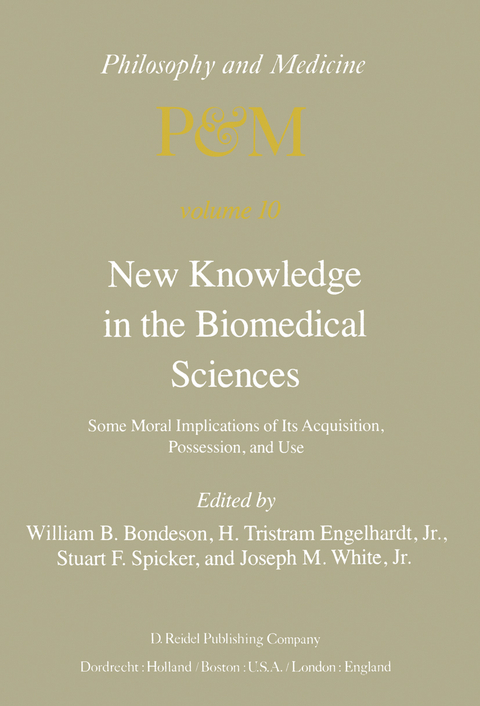
New Knowledge in the Biomedical Sciences
Springer (Verlag)
978-94-009-7725-9 (ISBN)
The spectacular development of medical knowledge over the last two centuries has brought intrusive advances in the capabilities of medical technology. These advances have been remarkable over the last century, but especially over the last few decades, culminating in such high technology interventions as heart transplants and renal dialysis. These increases in medical powers have attracted societal interest in acquiring more such knowledge. They have also spawned concerns regarding the use of human subjects in research and regarding the byproducts of basic research as in the recent recombinant DNA debate. As a consequence of the development of new biomedical knowledge, physicians and biomedical scientists have been placed in positions of new power and responsibility. The emergence of this group of powerful and knowledgeable experts has occasioned debates regarding the accountability of physicians and biomedical scientists. But beyond that, the very investment of resources in the acquisition of new knowledge has been questioned. Societies must decide whether finite resources would not be better invested at this juncture, or in general, in the alleviation of the problems of hunger or in raising general health standards through interventions which are less dependent on the intensive use of high technology. To put issues in this fashion touches on philosophical notions concerning the claims of distributive justice and the ownership of biomedical knowledge.
Section I / The Physician as Moral Arbiter.- The Physician as a Moral Force in American History.- The Physician as Moral Arbiter.- Section II / The Costs of New Knowledge.- Moral Issues Relating to the Economics of New Knowledge in the Biomedical Sciences.- Only the Best is Good Enough?.- Section III / Costs, Benefits, and the Responsibilities of Medical Science.- Morality and the Social Control of Biomedical Technology.- Rights and Responsibilities in Medical Science.- Health, Justice, and Responsibility.- Section IV / Biomedical Knowledge: Libertarian vs. Socialist Models.- The Need to Know: Utilitarian and Esthetic Values of Biomedical Science.- Medical Knowledge as a Social Product: Rights, Risks, and Responsibilities.- Biomedical Knowledge: Progress and Priorities.- Section V / Biomedical Ethics and Advances in Biomedical Science.- Applying Morality to Advances in Biomedicine: Can and Should This be Done?.- Biomedicine, Health Care Policy, and the Adequacy of Ethical Theory.- Section VI / Conclusions and Reflections: Present and Future Problems.- Why New Technology is More Problematic than Old Technology.- The Uses of Biomedical Knowledge: The End of the Era of Optimism?.- The Best is Yet to Come.- Scientific Advance, Technological Development, and Society.- The Life-World and the Patient’s Expectations of New Knowledge.- Epilogue.- Notes on Contributors.
| Reihe/Serie | Philosophy and Medicine ; 10 |
|---|---|
| Zusatzinfo | XVIII, 225 p. |
| Verlagsort | Dordrecht |
| Sprache | englisch |
| Maße | 155 x 235 mm |
| Themenwelt | Sachbuch/Ratgeber ► Natur / Technik ► Garten |
| Geisteswissenschaften ► Philosophie ► Allgemeines / Lexika | |
| Geisteswissenschaften ► Philosophie ► Ethik | |
| ISBN-10 | 94-009-7725-5 / 9400977255 |
| ISBN-13 | 978-94-009-7725-9 / 9789400977259 |
| Zustand | Neuware |
| Haben Sie eine Frage zum Produkt? |
aus dem Bereich


